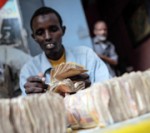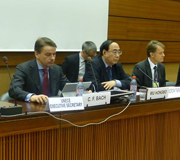
The international community has the means to improve the lives of people everywhere. But we need to make sure that the right financing gets to where it is needed. The Third International Financing for Development Conference in Addis Ababa aims to accomplish just that and it offers a chance to secure financing for sustainable development. Preparations are now entering a critical phase to ensure a successful outcome of the event benefitting both people and the planet.
UN DESA’s Under-Secretary-General and the Conference Secretary-General Mr. Wu Hongbo leads the efforts and he has been traveling across continents to make sure that inputs and views from different stakeholders and regions across the globe are taken into account as the countdown continues to this milestone event in Addis Ababa, Ethiopia, on 13-16 July.
“One week ago, the co-facilitators of the preparatory process, Ambassador Pedersen of Norway and Ambassador Talbot of Guyana, made public the first draft of the Addis Ababa outcome document,” Mr. Wu said as he addressed the Regional Consultation on Financing for Development held on 23 March in Geneva.
“As you know, 2015 provides a unique opportunity to chart a new era of sustainable development. Addis Ababa is the first of three major milestones that are likely to shape international cooperation for years to come”
Wu Hongbo
UN DESA’s Under-Secretary-General
and Conference Secretary-General
It addresses the full remit of the Financing for Development agenda […],” he added. “But it also goes beyond Monterrey and Doha to fully take into account the report of the Open Working Group on Sustainable Development Goals (SDGs), the report of the Intergovernmental Committee of Experts on Sustainable Development Financing, and the Secretary-General’s synthesis report.”
A successful outcome in Addis Ababa should be comprised of three key elements: (1) a cohesive and holistic financing framework for the post-2015 development agenda; (2) concrete deliverables in crucial areas of sustainable development, such as infrastructure, agriculture, social needs, and SMEs; (3) a strong follow-up process to ensure that no country is left behind.
Regional dimension vital
Organized by the UN Economic Commission for Europe (UNECE) and the Regional UN Development Group for Europe and Central Asia, the event provided a regional input to the global negotiations. The importance of the regional dimension on the road to Addis Ababa and beyond 2015 was stressed at the event, which was attended by around 150 participants, including ex perts and representatives of Governments, civil society, private sector and other international organizations.
Michael Gerber, Ambassador, Special Envoy for Global Sustainable Development, Switzerland, who chaired the Consultation, urged to have “a frank exchange”’ on some of the key issues the Addis Ababa Conference needs to deliver on: “how to unlock private resources for sustainable development; how to create a conducive international environment for domestic resource mobilization; and how a renewed global partnership will look like”.
Huge financing needs and importance of ODA
Financing needs are huge, but as Manuel Sager, Secretary of State and Director-General of the Swiss Agency for Development Cooperation, emphasized, “the money is there. Global savings by far surpass the needs to finance the Sustainable Development Goals (SDGs), with the vast majority of these savings lying in private hands”. What is required is to devise appropriate mechanisms and regulatory frameworks that can help channel these resources into meeting the SDGs. The UNECE region already has a wealth of experience on the mobilization of private sector resources, which provides a good foundation to tackle the financing challenges of the post-2015 development agenda.
The continued importance of Official Development Assistance (ODA) was stressed during the consultation but the question of financing for sustainable development should be framed in much broader terms. “Our ambition should be much larger than the ODA ambition. We need to ensure that all financial flows take into account and contribute to sustainable development needs,” said UNECE Executive Secretary Christian Friis Bach.
Indispensable role of regional commissions
 “Looking ahead, regional economic commissions will play an indispensable role in implementing the Addis outcome document and the post 2015 development agenda,” Mr. Wu said, as he addressed the UNECE event. He also highlighted his recent visit to Washington where he met with IMF and World Bank officials. “Last week, I visited the World Bank and held very frank discussions with Dr. Kim and some of the board members. ODA was an issue raised a lot during the meetings,” Mr. Wu explained.
“Looking ahead, regional economic commissions will play an indispensable role in implementing the Addis outcome document and the post 2015 development agenda,” Mr. Wu said, as he addressed the UNECE event. He also highlighted his recent visit to Washington where he met with IMF and World Bank officials. “Last week, I visited the World Bank and held very frank discussions with Dr. Kim and some of the board members. ODA was an issue raised a lot during the meetings,” Mr. Wu explained.
Earlier in March, Mr. Wu also took part in the Latin American and Caribbean Regional Consultation on Financing for Development, organized by the Economic Commission for Latin America and the Caribbean (ECLAC) and Chile’s government.
The Regional Consultation was inaugurated by Heraldo Muñoz, Chile’s Minister of Foreign Affairs; Mr. Wu; Jessica Faieta, Director for Latin America and the Caribbean of the United Nations Development Program (UNDP); and Alicia Bárcena, ECLAC’s Executive Secretary.
During his speech, Minister Muñoz underlined the importance of the meeting, allowing the region to make inclusive proposals for sustainable development with equality to the conference in Addis Ababa. “The heart of the new development agenda must be inclusion, integrating environmental, social and economic dimensions,” he said.
At the end of March, Mr. Wu also attended the African Union Conference of African Ministers and the ECA Conference of African Ministers of Finance, Planning and Economic Development, held in Addis Ababa.
Unlocking resources for the benefit of all
For Conference Secretary-General Mr. Wu, a busy agenda lies ahead for the coming months. Some of the next events in preparation for the conference include the hearings with civil society and the business sector (8-9 April), the second drafting session on the Conference outcome document (13-17 April), the IMF and World Bank Spring Meetings in Washington D.C. on 17-19 April, the ECOSOC Special high-level meeting with the World Bank, IMF, WTO and UNCTAD (20-21 April), and the joint session between the Financing for Development and the post-2015 processes (21-24 April).
The next round of regional consultations will take place in Amman, Jordan on 7-8 April, and then in Jakarta, Indonesia, on 29-30 April, gathering inputs from Western Asia and Asia and the Pacific regions. The third drafting session on the outcome document will be held on 15-19 June.
As preparations continue towards this landmark event in Ethiopia, the hopes and expectations are high. In Addis, there is a new opportunity to forge partnerships between governments, civil society and businesses to create the mechanisms and incentives needed to align people-centred public and private investments for the greatest possible impact.
“As you know, 2015 provides a unique opportunity to chart a new era of sustainable development. Addis Ababa is the first of three major milestones that are likely to shape international cooperation for years to come,” Mr. Wu said as he addressed the event in Geneva. “In Addis, the international community must lay the groundwork for a successful Summit on sustainable development at the United Nations in September and the climate change conference in Paris in December.”
